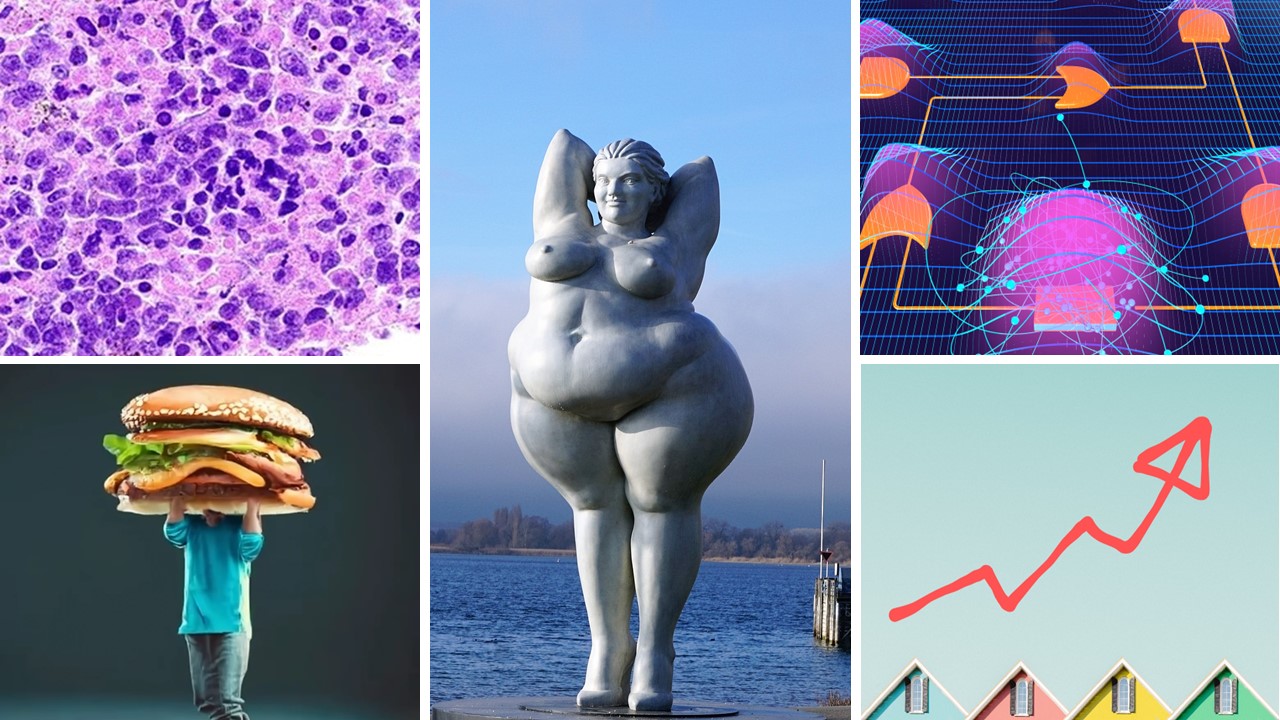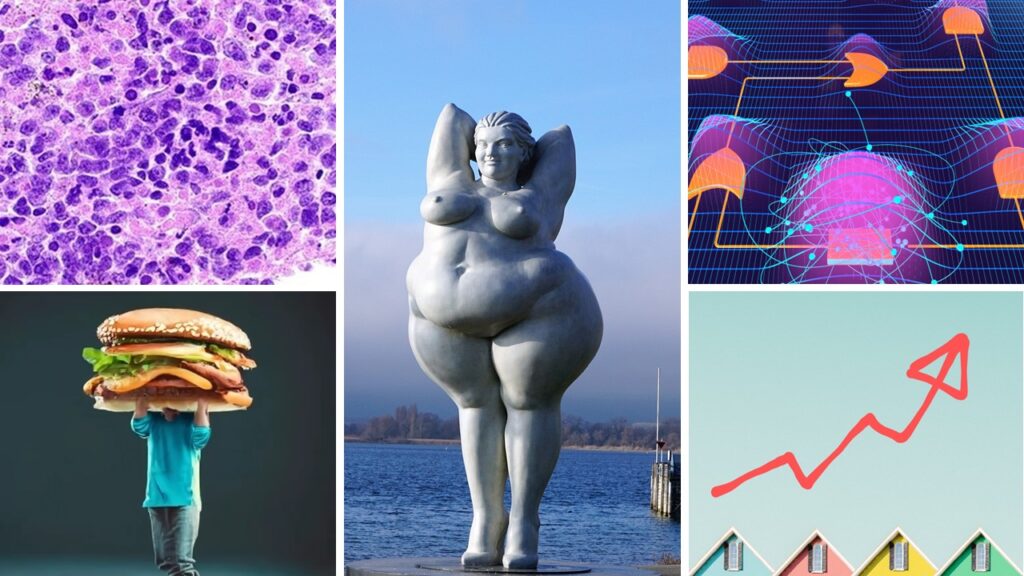10 selected Research Luxembourg results – July 2023
28 August 2023

Luxembourg News in Science & Research
An effective antibody against skin cancer; How youth perceive their weight; European health data; The overconsumption of harmful products: here are the latest scientific news updates from Luxembourg.
Craiyon; Pixabay; Flickr; Pexels; Adobe Stock
An antibody to tackle skin cancer?
Laboratoire National de Santé (LNS), Luxembourg Centre for Systems Biomedicine (LCSB), Luxembourg Institute of Health (LIH)
An ingenious antibody could succeed in overcoming the defence mechanisms of certain cancers. How? By neutralizing the action of a protein called GDF-15, which is abundantly secreted by solid tumours such as melanomas (skin cancers), liver cancers, or bladder cancers. GDF-15 prevents our immune system, especially T lymphocytes, from infiltrating the tumour and eliminating it. However, T lymphocytes are crucial for the success of immunotherapies currently being developed against cancer. Considering that GDF-15 is strongly overexpressed in approximately 50% of solid tumours, blocking it could have a significant therapeutic impact.
These results have been published in the prestigious journal Nature Communications by an international team of researchers, including Prof. Michel Mittelbronn, Head of the National Center of Pathology at LNS. Thanks to this new advancement, current immunotherapies will have much greater chances of success.
To the press release / To the publication
How do young people perceive their weight nowadays?
Faculty of Humanities, Education and Social Sciences (FHSE) – University of Luxembourg
An accurate estimation of our weight status – in other words, how we perceive our bodies – is an important factor in obesity prevention. However, this perception seems to change in the Western world, as shown by a very large study recently published in the journal Child and Adolescent Obesity. Indeed, underestimation of body weight has increased, while overestimation has decreased for both genders over the last decade. While these changes vary from country to country, they cannot be solely explained by the increase in national overweight rates. The results thus seem to indicate a profound shift in body image within our societies; the question remains how to utilise this for improving prevention and public health campaigns.
This extensive study, involving 745,000 adolescents from 41 European countries (including Luxembourg), the USA, and Canada, was conducted by Anouk Geraets from the University of Luxembourg.
To the press release / To the publication
Overview of the housing market in Luxembourg: Several concerning observations.
Luxembourg Institute of Socio-Economic Research (LISER)
1,000 individuals hold over 40% of the residential land owned by all individual persons in Luxembourg. This is one of the findings from a recent publication by LISER in collaboration with the Housing Observatory. But that’s not all: rents for new rental contracts have significantly increased (+11% from the 1st quarter of 2022 to the 1st quarter of 2023); the exclusion of the most vulnerable households from the private market is worsening (rising prices and rents, less favourable conditions for obtaining mortgage loans).
This new report includes the results of several major recent housing studies. Land remains the major source of the increase in housing prices in Luxembourg: between 2010 and 2021, the cumulative rise in land prices (+136.5%) was significantly higher than that of newly constructed housing prices (+107.4%). The share of land owned by public and semi-public entities (state, municipalities, etc.) is also steadily increasing.
Such observations necessitate thorough consideration to prevent the reinforcement of social inequalities.
To the publication (in French)
Is the Luxembourg media landscape inclusive, diverse, and respectful?
Faculty of Humanities, Education and Social Sciences (FHSE) – University of Luxembourg
Media pluralism remains relatively stable in Luxembourg, as indicated by the latest report from the University of Luxembourg.
Using the Media Pluralism Monitor, a tool specifically designed to identify risks to media pluralism, including its social and political dimensions within a society, researchers have highlighted some improvements, such as increased transparency of public administration for journalists. They also emphasise some problematic aspects, notably the insufficient representation of women in key positions (editors-in-chief, leadership) within major media outlets.
Furthermore, protection against disinformation and hate speech is not yet optimal: there is no media education course at the university level, and there is a lack of journalism and information ecosystem training.
To the press release (in French) / To the publication (in French)
The fabulous destiny of polaritons
Department of Physics and Materials Science (DphyMS) – University of Luxembourg
There are entities that are neither light nor matter but a hybrid between the two: polaritons. Their astonishing properties are the subject of numerous research efforts, as they are capable of slowing down or accelerating chemical reactions to which they are added, and even generating entirely new reaction products. In a unique experiment, an international team of researchers, including Daniele Brida from the University of Luxembourg, bombarded polaritons with incredibly short bursts of light pulses. The results, published in Nature Communications, showed a collapse of polaritons that was much faster than anticipated.
What does it mean? According to the authors, these new insights are pushing research towards “complete control of ultrafast chemical processes on the nanoscale.” Such processes are utilised in various fields, including medicine (targeted therapies using nanoparticles), green chemistry, or energy storage (batteries, supercapacitors, etc.).
To the press release / To the publication

What has been the impact of the pandemic on the health of young people in Europe?
Faculty of Humanities, Education and Social Sciences (FHSE) – University of Luxembourg
With hindsight, the impact of measures taken during the pandemic is becoming easier to assess. A large European study has been able to demonstrate that school closures and social distancing measures have affected the health of children and adolescents, with a particularly negative effect on their mental health.
Those most likely to have suffered the negative effects were older children, females, those from less affluent families, those facing prolonged school closures or lacking social support. Young Luxembourg nationals fare better than the average of the 22 countries studied. On an international level, nearly half of the adolescents reported experiencing school-related stress, especially when the number of days of school closure was high. Interestingly, it is worth noting that the number of days of closure did not have a proven impact on academic performance.
Dr. Caroline Residori from the University of Luxembourg played a leading role in the report.
To the press release / To the publication
Parkinson’s disease and sleep disorders: The link is confirmed
NCER-PD (LCSB, LIH, IBBL, CHL, LNS)
On June 15th, the first phase of the large Luxembourg national study on sleep concluded. Over 20,000 Luxembourgish residents, aged 55 to 75, participated in an online survey about the quality of their sleep. Launched in 2021, the study aims to establish a connection between certain sleep disorders and the future onset of neurodegenerative diseases such as Parkinson’s disease. The goal is to provide early care for these patients, screen for potential issues, and develop preventive treatments.
Participants underwent questionnaires, and for some, olfactory tests, medical evaluations, and finally polysomnography tests. The first participants have completed all study stages and might now have early access to existing treatments, as well as potential participation in future clinical trials aimed at preventing the progression of neurodegeneration.
Conquering cancer’s defence mechanisms: When it comes to “warming up” tumours
Luxembourg Institute of Health (LIH)
Immunotherapy holds promise and potential for cancer treatment and cure, as seen earlier with GDF-15. Unfortunately, it sometimes fails. To better understand the reasons behind these failures and explore solutions, a team of researchers has published a comprehensive assessment of cancer cells’ defence mechanisms, their ways of evading our immune system, and potential therapeutic strategies.
A tumour is considered “cold” when it becomes inaccessible to our immune system: no T lymphocytes can infiltrate it. T lymphocytes are responsible for destroying cancer cells. To “warm up” tumours (meaning to help lymphocytes carry out their job), several therapies are being developed. Among them, hypoxia corresponding to oxygen deprivation. Other approaches include oncolytic viruses (targeting malignant cells), vaccines, nanoparticles, as well as conventional therapies like radio chemotherapy. These strategies aim to enhance the immune response against cancer and improve the success of immunotherapy.
Are our European health data useful for other populations?
Luxembourg Centre for Systems Biomedicine (LCSB)
If it is possible to determine the risk of developing certain diseases based on the genes we carry, a recent study conducted by researchers from LCSB goes further by demonstrating that polygenic risk scores from a specific ethnic population can be reliably used to stratify the risk of a different ethnic population. Polygenic risk scores are used to assess the risk of developing severe diseases such as type 2 diabetes, cardiovascular diseases, and obesity.
Specifically, populations of European and South Asian descent residing in the United-Kingdom were analysed. The results are promising: statistics generated from the European population could potentially be used for the South Asian population, thereby facilitating prevention and early detection of these severe metabolic diseases.
How to combat the overconsumption of harmful products?
Luxembourg Institute of Socio-Economic Research (LISER)
In the fight against overconsumption, it might seem logical to ban volume discounts, as theory suggests they encourage buying more. However, this approach could prove counterproductive, as shown by a recent analysis supervised by Prof. Marc Suhrcke from LISER. Researchers examined consumer reactions following the prohibition of volume offers for alcohol sales, a measure advocated by the WHO since 2010. Several countries, including Scotland, which served as a model for this study, followed these recommendations. Unexpectedly, this ban led to an increase in alcohol sales rather than a reduction: sellers opted for more direct discounts (per unit), encouraging some households to increase their purchase frequency and buy more.
These findings are significant not only for curbing alcohol consumption but also for products high in fats, sugars, and salt.
To the press release / To the publication
Author: Diane Bertel








